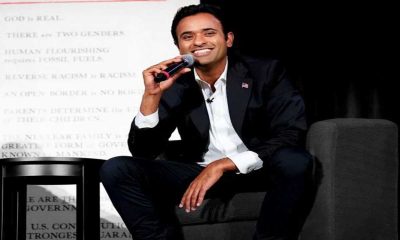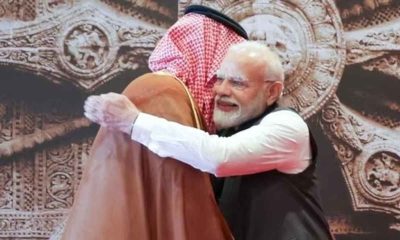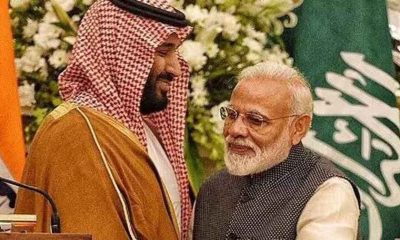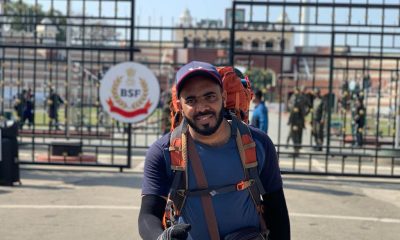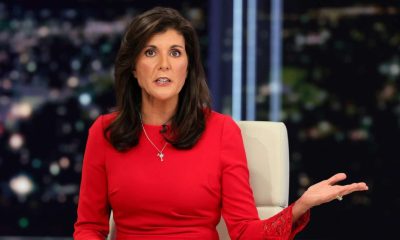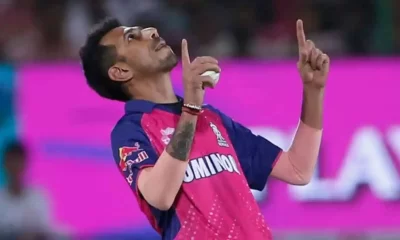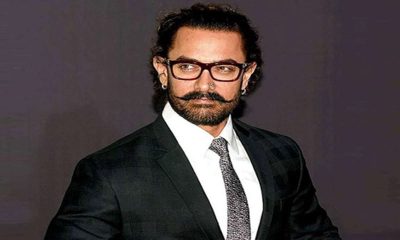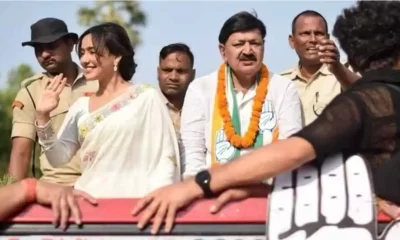Latest world news
A crisis is brewing in the Middle East and Crown Prince Mohammed bin Salman is at its centre

[vc_row][vc_column][vc_column_text]By Seema Guha
Is Saudi Arabia about to implode? Can ambitious Crown Prince Mohammed bin Salman’s audacious plans that have shaken up Saudi Arabia’s staid ruling family succeed? In the last few weeks, the House of Saud, which had for decades ruled by consensus, with one old monarch succeeded by an ageing brother, now suddenly open up to a new line when the baton is being handed over from father to son? The jury is still out on that.
But in recent weeks King Salman bin Abdulaziz al Saud Salman’s favourite son has proceeded with breath-neck speed to bring in sweeping changes in the oil rich kingdom. In the name of an anti-corruption drive, he has arrested eleven princes as well as scores of senior officials.
Prince Miteb, son of the late King Abdullah, and commander of the powerful National Guards, Saudi Arabia’s most prominent and outspoken businessman Prince Alwaled bin Talal, are all in the confines of a luxury hotel on charges of corruption. The Crown Prince is taking down all possible rivals within the family.
Around the same time as these arrests, a helicopter crash killed Prince Mansour bin Muqrin, deputy governor of Asir province and a number of his officials. Clan and tribal loyalities run deep in the country and it is not yet clear if these large scale arrests and removal of four sitting ministers on charges of corruption would be taken lightly.
The 32-year old crown Prince, who was not in the limelight till his father became King, now yields enormous power. He is the defence minister and is in charge of major economic reforms, aimed at changing the kingdom’s reliance on oil and diversifying the economy. An ambitious plan Vision 2030 was unveiled by the Crown Prince recently. He is said to have worked out the vision with the help of top Western managers hired from across the world with huge salaries. He is also keen to list the state owned oil giant Aramco in the stock exchange.
By removing the commander of the National Guards, and placing one of his loyalists as chief, the Prince has indirectly also bought the elite force to report to him. He is the chairman too of the newly formed anti-corruption committee, which has wide reaching powers to trace funds and assets and prevent their transfers or liquidation on behalf of individuals and entities. All in all, the Crown Prince is calling the shots and virtually in charge of the kingdom. But by the arrests of powerful members of the royal family, he would have also made bitter enemies, who would be biding their time to strike back.
Anti-corruption drives are always popular among ordinary citizens. Saudi Arabia is no exception. The Crown Prince has publicly said several times that no one would be spared, not even those with royal connections. He has been as good as his word and this has been welcomed by the general public. However the question remains, is the anti corruption drive aimed at cleaning up the system or to target those who may one day challenge the Prince. Saudi Arabia has never been a transparent system and most members of the extended royal family have been conducting business in this way for generations. Saudi Arabia is not prepared for the change to transparency and accountability.
Prince Salman hopes to convert Saudi Arabia to a moderate Islamic kingdom and is taking on the powerful clergy wedded to the puritanical and austere Wahhabi school. The strict norms against music and entertainment, the segregation of men and women and other orthodox practices would be out of the window if the Prince had his way. He is popular among the young Saudis for his modern views. Religious police that enforced strict dressing for women and often abused power are no longer roaming the streets of Riyadh looking to bring offenders to book. Women are in the process of being allowed to drive. Entertainment, which also brings in the big bucks, is being encouraged by him.
The clergy plays a pivotal role in Saudi Arabia. The royal house of Saud, as custodians of the mosques at Mecca and Medina are venerated across the Sunni world and the state promotes the Wahhabi school of austere Islam. The King and clergy have so long ruled by consensus. The Crown Prince’s desire to turn the kingdom into a moderate Islamic state may in time turn them against the ruling family. But so far there are no signs of that happening as the Crown Prince has not yet ridden rough shod over clergy.
But the hot blooded Prince is not merely cracking down on perceived enemies within the kingdom. Like the rest of Sunni powers, Saudi Arabia has always regarded Shia Iran with suspicion. Since state structures in Iraq collapsed following the American invasion and the sectarian war led to blood baths across the country, Iran’s clout there has increased manifold. Saudi Arabia and the smaller Gulf countries, worried about Iran’s growing influence in the region, are out to eradicate Iran’s footprints in the region. A proxy war is on between Saudi Arabia led Sunnis and Shia Iran in Syria, Yemen, Iraq and Lebanon. There Hizbollah is backed by Iran and Saudi Arabia has already triggered a crisis by forcing prime minister Hariri to resign. Hariri announced his resignation from Saudi Arabia last week.
The Saudis have cultivated excellent ties with US President Donald Trump. Unlike Obama, Trump regards Iran as a principle enemy of the US. He is already in the process of pulling out of the landmark nuclear agreement signed between Iran, the US, France, China, UK, Russia and Germany. The new line up in West Asia is Saudi Arabia, US and Israel ranged against Iran and Russia. Bashar-al Asad of Syria is also with them. The resignation of Hariri is escalating the crisis in the region. Saudis and Israel (which is against Hezbollah in Lebanon) are bent on pushing Iran to a corner. A recent missile attack by Houthi rebels of Yemen at Riyadh International airport, is being blamed on Iran. War drums are beating in West Asia. Unless the Crown Prince is restrained, the oil rich states may soon be in turmoil. War in the region will affect oil supplies and could hit the world economy. Countries like India, that gets most of its supplies from Saudi Arabia, will be hard hit. However, though Donald Trump himself is as aggressive as the Crown Prince, saner elements within the US establishment like Secretary of State Tillerson are urging restraint.
Will the Crown Prince listen? He has had little success in the war in Yemen, or in the blockade of Qatar (for allegedly playing footsie with terror groups) spearheaded by Saudi Arabia. He would be looking to Lebanon to take on Hezbollah. Neither Iran nor the Hezbollah are pushovers, and if Saudi Arabia continues to its current disastrous ways, the region may well implode.[/vc_column_text][/vc_column][/vc_row]
Latest world news
World Earth Day 2024: Google Doodle showcases aerial view of planet’s natural beauty
Google celebrated Earth Day 2024 with a special doodle featuring an aerial view of our planet’s biodiversity.
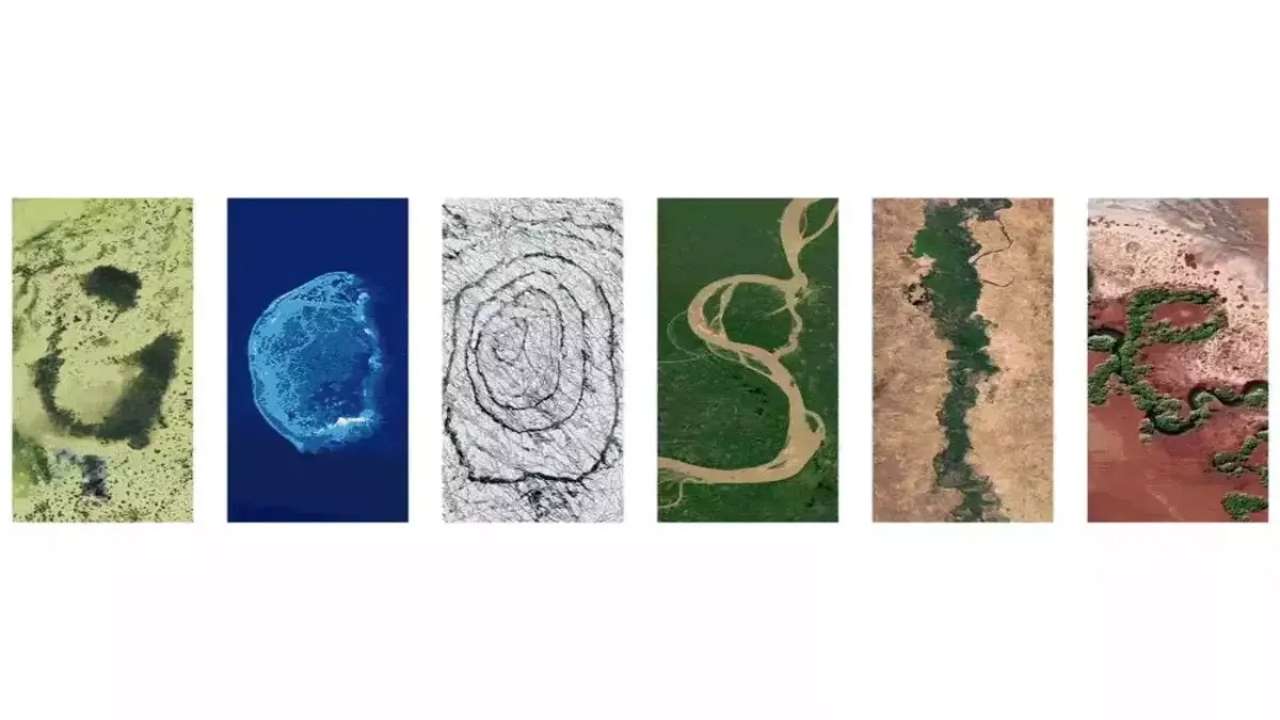
Google shared a doodle today to celebrate World Earth Day 2024, which showcased aerial photos of the planet’s biodiversity and natural beauty. Google reminded us of the importance of protecting planet earth for future generations with the help of this doodle.
The Google letters depict specific locations across the globe where people, communities, and governments work every day to help protect the planet’s natural beauty, biodiversity, and resources, according to the explanation of the annual Earth Day 2024 doodle on their website.
It said, these examples remind us that there’s much more to do to address the climate crisis and biodiversity loss, but also offer the promise of hope and optimism.
The islands of Turks and Caicos are represented by the letter “G.” The islands’ conservation efforts are concentrated on protecting important regions for biodiversity and addressing persistent environmental problems.
The largest reef in the southern Gulf of Mexico and a UNESCO biosphere reserve, Scorpion Reef National Park, is represented by the letter “O” in the Mexican flag.
The letter “O” features Iceland’s Vatnajokull National Park, which was designated as a national park in 2008 following decades of advocacy. The ecology within and surrounding the biggest glacier in Europe is safeguarded by this UNESCO World Heritage Site.
The letter “G” has the Jau National Park in Brazil on it. It is a UNESCO World Heritage Site and one of the biggest forest reserves in South America.
The Great Green Wall of Nigeria is represented by the letter “L,” and the Pilbara Islands Nature Reserves of Australia are represented by the letter “E.”
Meanwhile, Earth Day is a worldwide event that promotes protection of the environment every year. April 22 serves as a reminder of the importance of conservation efforts and sustainable practices to guarantee a healthier world and a brighter future.
The occasion inspires people across the world to come together and take action to protect the environment, strengthening our bonds with nature and promoting good change.
Latest world news
Bigg Boss 14 contestant Rahul Vaidya struggles walking in knee deep water, compares Dubai rains with Mumbai floods
Singer and TV personality Rahul Vaidya was recently stranded in the Dubai rains.

Rahul Vaidya, who was in Dubai ahead of his show which was scheduled to take place today, left the country due to heavy rains and reached Kolkata. The artist shared on social media his encounters in the UAE city, including challenges like walking through knee-deep water. Rahul provided an update regarding the heavy rainfall in Dubai on his Instagram profile.
The Bigg Boss 14 contestant revealed that he was in Kolkata and prepared to do an evening performance. Recalling the terrifying period he went through, Vaidya said there was a lot of confusion and panic in Dubai. The situation was similar to that when heavy floods hit Mumbai in 2005.
Vaiday also posted seval other images and videos of cars that were underwater and flooded roadways. The Bigg Boss 14 contestant, who shared his ordeal, claimed that even though it had just rained for two hours, the situation was dire.
In one of the video, which went viral he can be seen struggling in walking in knee-deep water. He can be also seen holding his sneakers in one hand and with other hand he was seen managing other things.
This is the result of the two hours of rain that it had, he can be heard saying in the video. Vidya also said he dosen’t believe Dubai is accustomed to a lot of rain. Everything had stopped working, he remarked.
After taking part in the first season of the singing reality show Indian Idol, Rahul Vaidya gained widespread recognition. In addition to Bigg Boss, he took part in Khatron Ke Khiladi 11.
Meanwhile, heavy rains that triggered flooding in the UAE and Bahrain, which left 18 people dead in Oman on Sunday and Monday, have paralyzed the financial hub of the Middle East, Dubai.
A lot of incoming flights were diverted from Dubai’s international airport because of the rain. At 7:26 p.m., the busiest airport in the world for foreign visitors stopped accepting new arrivals; a gradual resumption was announced for more than two hours later.
Images of planes navigating flooded tarmacs are making the rounds on social media.
According to pictures shared on social media, the flagship malls Dubai Mall and Mall of the Emirates both experienced heavy floods, while at least one Dubai Metro station had water up to the ankles.
There were several road collapses, severe flooding in residential areas, and numerous reports of leaks from windows, doors, and roofs.
Due to the unfavourable weather, schools around the United Arab Emirates were forced to close, and as more storms are predicted, the closures are anticipated to last until Wednesday. The government of Dubai allowed its staff to work remotely till this Wednesday.
Latest world news
Dubai sky turns green during storm in UAE, video goes viral
The UAE witnessed record-breaking rainfall on Tuesday and the National Centre of Meteorology recorded 254 mm of rainfall in less than 24 hrs in the Khatm Al Shakla area in Al Ain.

1 person was killed in UAE as it witnessed heavy rainfall on Tuesday, stranding commuters, flooding roads, disrupting trains and flights and resulting in water leakage from mall ceilings. The UAE witnessed record-breaking rainfall on Tuesday and the National Centre of Meteorology recorded 254 mm of rainfall in less than 24 hrs in the Khatm Al Shakla area in Al Ain. It is being said that the rainfall was the highest documented since the start of data collection in 1949.
The heavy rainfall in UAE came days after a similar situation in neighbouring Oman, where 13 people were killed in flash floods. Many parts of Oman saw torrential rains, which caused students to be trapped in buses and swept away motorists and trapped people in their homes.
Videos from Dubai circulating on social media showed widespread waterlogging on roads in Abu Dhabi, Dubai and other important cities. This left daily commuters in cars and other vehicles struggling to get back home. Dubai metro station too was seen flooded and closed.
One such video circulating on social media shows the aerial view of the city of Dubai from the top of a building. In the video the stormy winds are seen blowing over the city of Dubai. As the storm intensifies the Dubai sky turns green and ultimately gets covered by heavy rainfall. The video has gone viral on social media with more than 1.1 million views.
Another video showed water leakage from the ceilings of shopping malls, flooding the floors and destroying goods. A video which was shot in the famous Mall of the Emirates, showed pieces of ceiling falling as the rainwater gushed inside. Videos from many outlets of the Deira City Centre mall chain showed escalators being rendered unusable. Majid Al Futtaim, the company which owns the Mall of Emirates, said that the shopping complexes have been kept open and the customers are being sent away from the flooded areas.
-
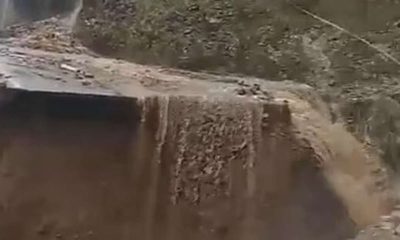
 India News6 hours ago
India News6 hours agoLandslide hits Arunachal Pradesh, highway linking Indo-China border affected
-
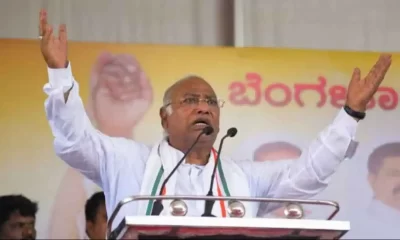
 2024 Lok Sabha Elections23 hours ago
2024 Lok Sabha Elections23 hours agoMallikarjun Kharge vows to continue politics till his last breath to defeat BJP
-
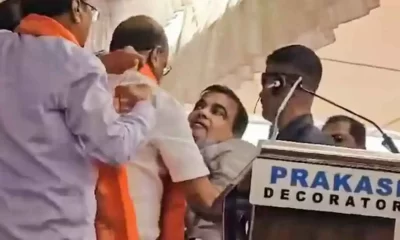
 2024 Lok Sabha Elections24 hours ago
2024 Lok Sabha Elections24 hours agoNitin Gadkari says he’s better now after collapsing at election rally in Maharashtra’s Yavatmal
-
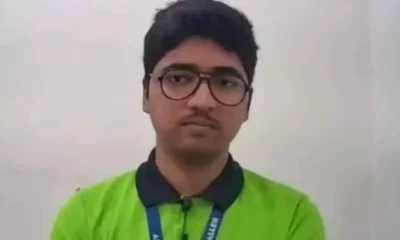
 Education4 hours ago
Education4 hours agoFarmer’s son Nilkrishna Gajare Nirmalkumar from Maharashtra scores 100 NTA score in IIT-JEE Mains 2024
-

 Entertainment6 hours ago
Entertainment6 hours agoBollywood stars Salman Khan, Alia Bhatt, Rekha, Sonakshi Sinha, Aditi Rao Hydari attend Sanjay Leela Bhansali’s Heeramandi premiere
-

 India News7 hours ago
India News7 hours agoTamannaah Bhatia summoned in illegal IPL streaming app case, to appear before cyber cell on April 29
-

 Cricket news7 hours ago
Cricket news7 hours agoIPL 2024: Rishabh Pant, Axar Patel score half centuries as Delhi Capitals beat Gujarat Titans by 4 runs
-
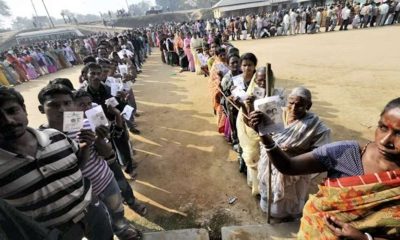
 2024 Lok Sabha Elections6 hours ago
2024 Lok Sabha Elections6 hours agoBihar: Election Commission extends voting timings for 4 Lok Sabha seats due to heatwave



